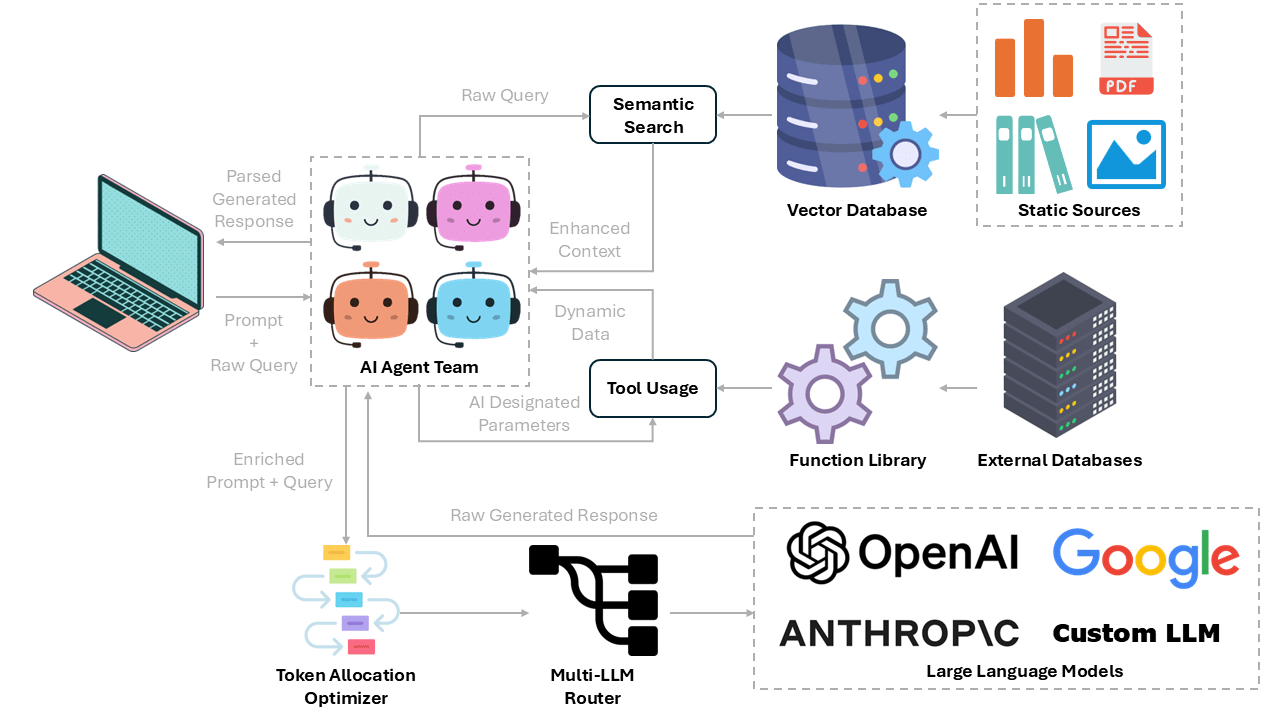These days, businesses are turning to conversational AI to level up their customer service, simplify operations, and stay ahead of the game. Google Dialogflow is a common choice for rule-based chatbots, but let’s be real—it is no longer sufficient in the age of large language models. Many companies struggle with its lack of customization, rigid workflows, limited control over their own data, and high maintenance costs. If you’re trying to grow and stay competitive, those shortcomings can feel like a roadblock.
At GPT-Trainer, we get it: your business needs customer engagement automation that works for you—not the other way around. That’s why we’re here to help you leverage state-of-the-art large language model-powered AI agents capable of auto-resolution, hyper-personalization, and deep integration with existing business systems.
In this guide, we’re sharing eight awesome alternatives to Dialogflow. Each one has its strengths, but we truly believe GPT-Trainer offers the most powerful, flexible, and secure platform for enterprises looking to supercharge their conversational AI.
What to Look For in a Dialogflow Alternative
Choosing the right conversational AI platform can feel overwhelming, but it doesn’t have to be! Focus on what really matters to your business and keep these six key factors in mind:
-
Usability
AI should be easy for your clients to use, and for your team to maintain. Your solution should not be understandable only by the tech experts. An effective platform empowers everyone—including non- developers—to build and refine conversational flows, so you can move faster without relying on dedicated experts for every tweak. -
Easy to Integrate
Your conversational AI framework should play nicely with the tools you already use—think CRMs, help desks, and ticketing systems. A well-integrated platform ensures your assistant works smoothly across channels without creating bottlenecks or extra work for your team. -
Customization
No two businesses are the same, so why settle for cookie-cutter solutions? Look for a platform that lets you design AI agents tailored to your brand, workflows, and processes. A lack of customization can hold you back from realizing the full value of a customer-facing solution. -
Scalability
As your business grows, your customer engagement solution needs to keep up. Whether it’s handling more interactions or managing more complex workflows, your conversational AI system should grow with you. -
Data Privacy and Ownership
Security is non-negotiable, especially if you’re in industries like healthcare or finance. Opt for platforms that prioritize data ownership and have enterprise-level security certifications. That way, you stay in control of your sensitive customer information. -
Transparent Costs
Nobody likes surprise expenses. Make sure you understand the full cost of ownership, including licensing, infrastructure, and maintenance. The best platforms strike a balance between robust functionality and predictable pricing.
8 Google Cloud Dialogflow Alternatives You Should Check Out
When it comes to automated chatbots, Dialogflow has long been a popular choice. But it’s not always the best option. These best alternatives offer the features, flexibility, and control enterprises need to excel.
1. GPT-Trainer

GPT-Trainer is a cutting-edge AI agent builder that empowers businesses to create personalized and efficient conversational AI experiences. With GPT- Trainer, businesses can harness the power of AI to automate support, capture leads, and personalize engagement.
GPT-trainer supports direct integrations with external databases and IT systems via general purpose API, webhooks, and LLM-powered function- calling, enabling advanced workflow automations in addition to chat. GPT- trainer has a granular user access control system.
The platform supports many modes of interaction. Out of the box, it contains an intuitive templated AI agent training workflow that allows users to create and deploy RAG-based multi-agent systems within minutes. Users can interact with the chatbot through a polished chat interface similar to ChatGPT, via a sharable link, as a javascript widget, or through social integrations like Slack, WhatsApp, Facebook Messenger, and Instagram.
Why GPT-Trainer stands out:
- No-Code Framework: GPT-Trainer requires no special training to use. Building new chatbots and maintaining existing ones is extremely easy.
- Multi-Agent Framework: GPT-Trainer is the first multi-agent framework that allows creators to put multiple AI agents within the same chatbot. This approach produces chatbots that are far more versatile and capable compared to single-agent ones.
- Data Security: GPT-Trainer is SOC II and ISO 27001 certified. It is GDPR compliant. The framework can be deployed in any location on AWS/Azure or delivered on-premises in an enterprise arrangement. Check out the security center.
- Flexible LLM Options: Switch between the most popular language models to optimize performance. The platform also supports custom models and fine-tuned ones.
- Human Support Handover: When AI agents cannot handle a customer request automatically, an alert is sent to a human agent for escalation. Alerts can be sent via webhooks.
- CRM Integration: Native integration with Zendesk and Hubspot. Additional integrations available through public API, Make, Zapier, or custom builds.
- Social Integrations: Native integration with Facebook Messenger, Instagram, WhatsApp, Slack, and SMS.
Best for: Enterprises looking for a balance of flexibility, security, and scalability.
Kore.ai is another notable player in conversational AI, offering virtual assistants that shine in customer service and business automation. The platform’s strength lies in handling complex interactions across multiple channels, and its prebuilt templates mean you can get started quickly.
2. Kore.ai
Kore.ai is another notable player in conversational AI, offering virtual assistants that shine in customer service and business automation. The platform’s strength lies in handling complex interactions across multiple channels, and its prebuilt templates mean you can get started quickly.
Why Kore.ai stands out:
- Omnichannel Support: Chat, email, voice, and social media—all in one place.
- Prebuilt Templates: Save time with ready-to-use solutions.
- Advanced NLP: Pinpoint user intent with high precision.
Best for: Businesses aiming for consistent, reliable customer experiences across multiple channels.
3. Cognigy.ai
Cognigy.ai makes conversational AI approachable for businesses of all sizes. Thanks to its intuitive drag-and-drop builder, even non-technical teams can design and deploy AI assistants effortlessly.
Why Cognigy.ai stands out:
- User-Friendly Design: Build workflows quickly with drag-and-drop tools.
- Multilingual Support: Handle global customer interactions like a pro.
- Integration-Ready: Easily connect to your existing tech stack.
Best for: Businesses prioritizing ease of use and robust multilingual capabilities.
4. IBM watsonx Assistant
IBM watsonx Assistant brings a powerful suite of tools to the table for building conversational interfaces. With its advanced machine learning and Natural Language Processing (NLP) capabilities, this platform is great for managing more complex customer interactions. Plus, IBM offers prebuilt industry-specific configurations, so you can hit the ground running with minimal setup time.
Why IBM watsonx Assistant stands out:
- Advanced AI Models: Handles tough queries with accuracy.
- Industry-Specific Solutions: Get up and running faster with prebuilt configurations.
- Ecosystem Integration: Taps into other IBM tools for enhanced functionality.
Best for: Enterprises already using IBM tools or those needing advanced data analysis capabilities.
5. Amazon Lex
If you’re working within AWS, Amazon Lex could be the perfect solution for you. This platform specializes in creating conversational interfaces with both voice and text support, making it a great option for applications like customer support, appointment scheduling, and more.
Why Amazon Lex stands out:
- AWS Integration: Connects seamlessly with your existing AWS tools.
- Voice and Text Capabilities: Perfect for multimodal interfaces.
- Scalability: Keeps things running smoothly, even during busy times.
Best for: AWS users who need a reliable, scalable conversational AI solution.
5. Amazon Lex
If you’re working within AWS, Amazon Lex could be the perfect solution for you. This platform specializes in creating conversational interfaces with both voice and text support, making it a great option for applications like customer support, appointment scheduling, and more.
Why Amazon Lex stands out:
- AWS Integration: Connects seamlessly with your existing AWS tools.
- Voice and Text Capabilities: Perfect for multimodal interfaces.
- Scalability: Keeps things running smoothly, even during busy times.
Best for: AWS users who need a reliable, scalable conversational AI solution.
7. Microsoft Copilot Studio
If your business already lives in the Microsoft ecosystem, Microsoft Copilot Studio might feel like a natural extension of your existing tools. It’s designed to integrate seamlessly with products like Dynamics 365, Teams, and Office 365, making it a great choice for businesses focused on workflow automation and productivity.
Why Microsoft Copilot Studio stands out:
- Microsoft Integration: Built to work effortlessly with Teams, Dynamics, and Office 365.
- Workflow Automation: Enhances productivity across different departments.
- Scalability: Works well for businesses of all sizes.
Best for: Companies that rely on Microsoft tools and want to boost productivity without complicating workflows.
8. Conversica
Conversica is all about making sales, marketing, and customer success teams more effective. This platform focuses on revenue-driven tasks like lead nurturing and customer engagement, helping businesses achieve better results with less manual effort.
With preconfigured workflows and personalized interactions, Conversica makes it easy to deliver results quickly. If your team needs a tool to streamline engagement and boost conversions, this platform is definitely worth considering.
Why Conversica stands out:
- Lead Engagement: Automates follow-ups to help close more deals.
- Revenue Focus: Delivers measurable ROI through smarter interactions.
- Preconfigured Workflows: Cuts down setup time for sales and marketing tasks.
Best for: Sales and marketing teams looking to simplify engagement and drive revenue growth.
Why GPT-Trainer is the Optimal Choice for Your Business

GPT-Trainer offers a comprehensive platform for building conversational AI tailored to business needs. Combining flexibility, security, and scalability, it enables businesses to streamline workflows, enhance customer interactions, and maintain control over data and systems.
Self-serve in 10 minutes. Custom solution in 4-6 weeks.
GPT-Trainer's no-code framework allows businesses to create AI assistants that integrate seamlessly with their existing workflows and IT systems. Its multi-agent architecture supports complex use cases and enables true automatic resolution of incoming requests.
Data Security and Compliance
With SOC II and ISO 27001 certifications and GDPR compliance, GPT-Trainer ensures robust data protection. Flexible deployment options, including on-premises and cloud setups via AWS or Azure, make it suitable for organizations with stringent regulatory demands.
Flexible Language Model Integration
GPT-Trainer supports multiple language models, including fine-tuned and custom options, allowing businesses to optimize performance without vendor lock-in.
Simplified Development Process
GPT-Trainer features both a templated no-code chatbot creation flow and a public REST API. Its user-friendly interface makes it accessible to teams without extensive technical expertise, while developers can build middleware or custom functions to expand the core platform’s capabilities.
Integrations. Integrations. Integrations.
With a wide variety of integration options for CRMs like Zendesk and HubSpot, GPT-Trainer does not require your sales and support teams to migrate to a whole new system. Built-in support for Facebook Messenger, Instagram, WhatsApp, Slack, and SMS extends the reach of customer-facing AI agents while human handover guarantees that complex issues are handled effectively.
Designed for Growth
GPT-Trainer’s architecture supports high-volume operations and scales efficiently. Managed hosting and dedicated servers are offered.
Support and Resources
Comprehensive documentation, white glove onboarding, and AI literacy training are available to assist organizations in their AI transformation.
Choose GPT-Trainer for Advanced Conversational AI
GPT-Trainer combines functionality, security, and flexibility to deliver robust AI solutions that align with business goals and industry standards.
Start building with GPT-Trainer today to enhance your conversational AI capabilities.

